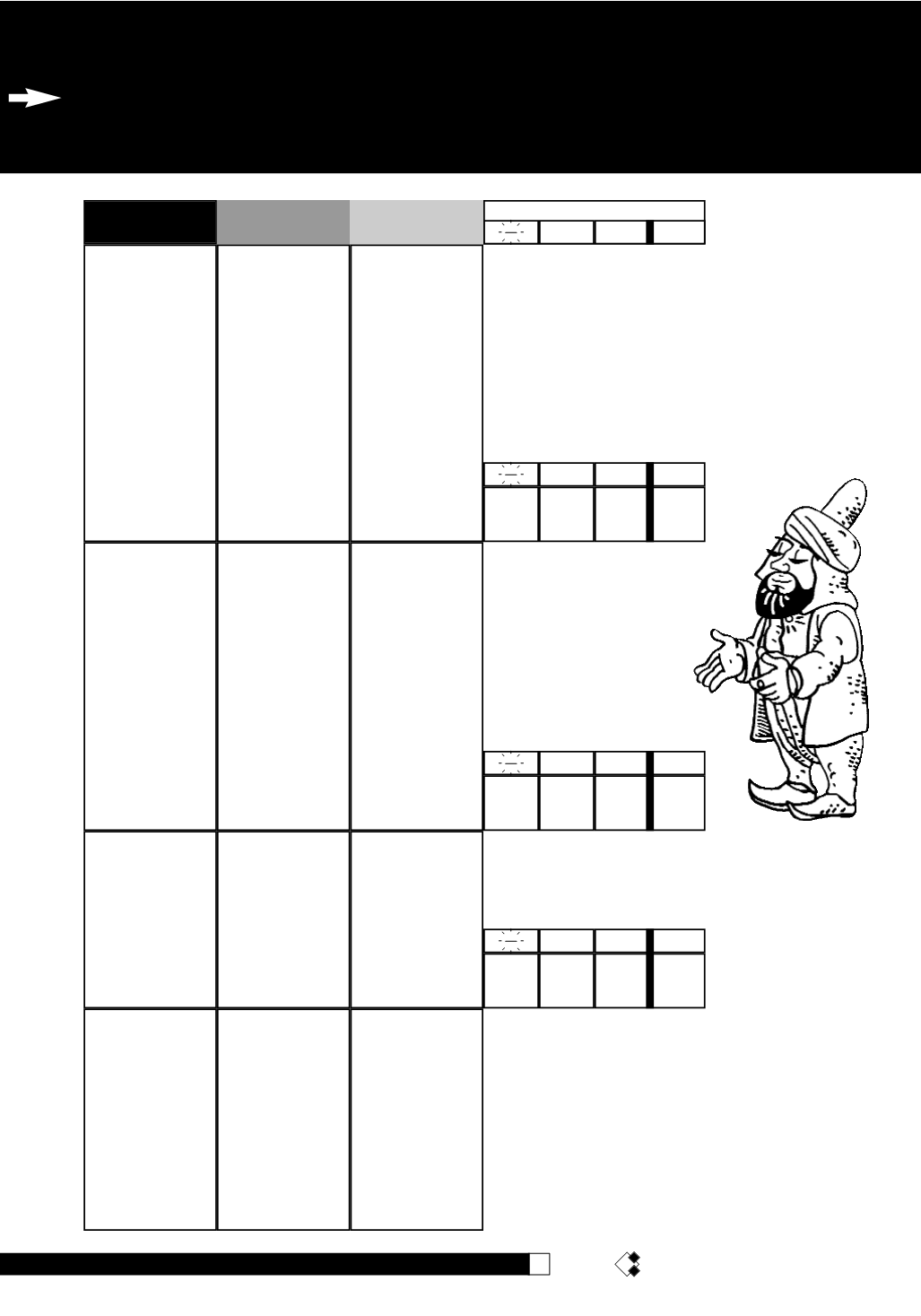
performance
ASSESSMENT
my faith
...
ISLAM
504
ry
fh
fh
fh
fh
fh
fh
fh
fh
fh
fh
fh
fh
fh
fh
fh
vn
LEARNERS PERFORMANCE
FIQH
OUTCOME
OBJECTIVES
LESSON
OVERVIEW
☺ ☺
are duty-bound to have pure
thoughts and feelings which
in turn lead to virtue and the
performance of good deeds
- discern that we should not
allow any form of impurity or
dirt to gather or remain on
our bodies or clothing
- understand a Muslim home
must be kept
Tahir
(clean)
and tidy at all times and that
children should be made to
participate in this endeavour
- discover that the
Masajid
are the most important of
public places and must be
kept exceptionally clean and
well perfumed
- learn that it is not possible
for a Muslim to practice
Islam and be in a state of
impurity
- learn that it is not possible
to attain closeness to Allah
without observing
Taharah
first
- learn a new
Ayah
and a
new
Hadith
- complete a crossword puz-
zle
- list the rules and obser-
vances of
Taharah
related to
the
Masjid
- colour-in a picture for
enjoyment
- complete an
Ayah
of the
Holy
Qur’an
LESSON 3
Istinja’
- learn about
the Istinja
’, toi-
let hygiene, its method and
etiquette
- recognize that
Istinja’
is an
important part of
Taharah
and personal hygiene and
that negligence with respect
to it constitutes a grave,
punishable sin
- appreciate that any useful
or sacred thing may not be
used for cleaning the private
parts
- learn that the one who
does not do
Istinja’
is not
Tahir,
and may not perform
salah
nor touch the Holy
Qur’an
- understand that it is not
permissable to urinate or
pass stool in any public area
or place where people take
rest or which they frequently
visit in connection with their
daily needs
- listen to an extract being
read out by the teacher
about
Istinja
’, toilet hygiene
- complete a word selection
exercise
- learn a new
Ayah
and a
new
Hadith
- answer questions related
to the lesson
-
complete
sentences
describing correct toilet eti-
quette
- identify the common
denominator represented by
a group of words
- complete two
Ahadith
☺ ☺
LESSON 4
Glossary
of Arabic
Terms
- understand and memorise
some important terms which
are commonly used in
Fiqh
(Islamic Law) studies
- recognize that the whole
life of a Muslim is governed
by these terms -
Fard,
Wajib, Sunnah, Mustahab,
Halal
and
Haram.
This is so
because a Muslim is con-
stantly striving to fulfill
Allah’s commands, emulate
the Blessed Prophet [s],
abstain from the
Haram
and
enjoy only the
Halal
- listen to an extract being
read out by the teacher
introducing some essential
Arabic Fiqh terms
- complete a series of sen-
tences for comprehension
- learn a new
Ayah
and a
new
Hadith
- complete and colour-in a
word search puzzle
- complete an
Ayah
and a
Hadith
☺ ☺
☺ ☺
LESSON 5
Wudu’
- learn about the signifi-
cance of
‘Wudu’
, ritual ablu-
tion, its method, etiquette
and various catagories
- discover that Islamic rites
and rituals will not be valid
and worthy of merit if
wudu’
is not performed correctly
- appreciate that
wudu’
is not
just washing but that it
reminds a Muslim that his
inner being needs to be puri-
fied too, his heart and mind,
attitudes and actions
- realize that a number of
prerequisites must be ful-
filled before performance of
the
wudu’
, eg.
istinja
’
- discover that the steps and
- listen to an extract about
Wudu’
, ritual ablution, its
method, etiquette and vari-
ous catagories
- listen to extracts detailing
the
Fara’id
,
Sunan
,
Mustahabbat
,
Makruhat
and
Nawaqid
of
Wudu’
- listen to extracts explaining
when
Wudu’
is compulsory
and when it is a
Sunnah
practice
- colour-in pictures of the
various steps of
Wudu’
- complete table identifying
Fara’id
&
Sunan
of
wudu
’
- learn a new
Ayah
and
Hadith
- complete a true and false


